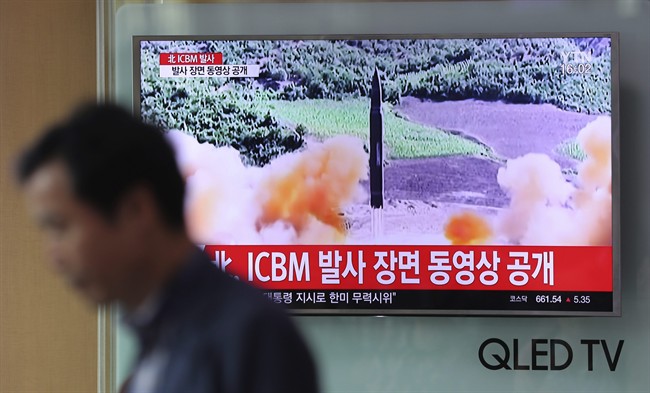Escalating tensions between North Korea and the United States have many people around the world on edge.

In a state media report Wednesday, the North Korean army claimed it was examining a plan to use ballistic missiles to make an “enveloping fire” around Guam, a U.S. territory that is home to Andersen Air Force Base. The comments came a day after U.S. President Donald Trump sent his own warning to North Korea: “They will be met with fire and fury like the world has never seen.”
READ MORE: North Korea, Donald Trump continue to trade escalating threats of fire
On Wednesday morning, Trump again spoke of nuclear weapons on Twitter, claiming that the U.S. will always be the most “powerful nation in the world.”
“My first order as President was to renovate and modernize our nuclear arsenal. It is now far stronger and more powerful than ever before….,” the president tweeted.
“Hopefully we will never have to use this power, but there will never be a time that we are not the most powerful nation in the world!”
READ MORE: U.S. acting like a ‘naughty, spoiled child’ over North Korea, Russian minister says
But vice president of the NATO Association of Canada, Tina Park, says a nuclear war is “highly unlikely.”
Park said that any real military action would require much more than “rhetoric,” and both sides would have to weigh their intelligence options and the political and economic ramifications.
WATCH: Trump’s tough talk aims to send message to North Korea: Tillerson

Will the U.S. benefit from a nuclear war?

Get breaking National news
Tensions have been rising over the past month, Park says both sides realize there is little benefit in starting a war.
“Nothing good is coming out of the rhetoric,” she said.
Park explained that other countries, such as Japan, China and Russia, would be affected by the war, and the U.S. wants to “maintain peace and security.”
She added that the U.S. has a “political alliance” with South Korea, and wouldn’t want to jeopardize their relationship by putting the country in danger.
READ MORE: North Korea releases Canadian pastor serving life sentence in prison, state media reports
What capabilities do the countries have?
U.S. nuclear expert Siegfried Hecker, who has visited North Korea’s nuclear facilities several times, told The Associated Press that he doesn’t think North Korea currently has the weapons needed for “enveloping fire” around Guam, as it threatened.
Hecker added that North Korea does not have sophisticated nuclear weapons, unlike the U.S., Russia, Britain, China and France.
READ MORE: North Korea’s missile could hit Canada, and we might not be protected, experts say
However, Park says that despite North Korea being an “impoverished economy,” they have heavily invested in their military capabilities.
North Korea shouldn’t be written off as a “crazy, irrational actor,” the professor explained, noting the U.S. needs to come up with “practical strategies” to deal with the country.
WATCH: North Korea allegedly now in possession of miniaturized nuclear weapons capability

What is Canada’s role in the conflict?
Canada’s role is to remain an ally for the U.S. and South Korea, Park said.
“Canada has a vested interest in Korea,” Park explained, noting factors such as trade and immigration.
WATCH: North Korea says it’s gearing up to strike U.S. territory Guam: report

With pre-existing “dire humanitarian conditions” in North Korea, such as widespread hunger and malnutrition, Park said Canada’s role should revolve around providing aid, and also assisting in diplomacy and dialogue.
“Canada is not a military power, with humanitarianism, we are uniquely suited.”
North Korea’s July test of a Hwasong-14 intercontinental ballistic missile (ICBM), with a range of anywhere from 6,700 to 8,000 kilometres, showed that the nation now has a weapon that could threaten parts of the Canada along the border with Alaska, experts told Global News last month.
READ MORE: Trump pledges ‘fire and fury,’ in words not unlike those of North Korea
But Park pointed out that North Korea is currently a non-threat to Canada.
“North Korea has nothing against Canada,” she said.
— With files from The Associated Press, and a file from Global News reporter Jesse Ferreras








Comments
Want to discuss? Please read our Commenting Policy first.